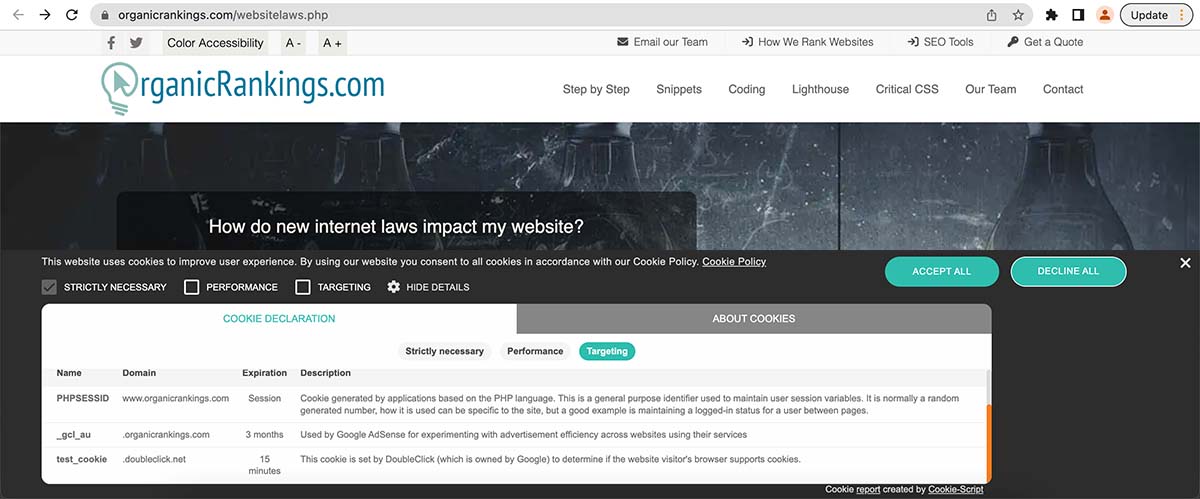Improving Web Accessibility with Technical SEO Tools
How new laws can affect how you manage your website and user information

Compliance and Consent for SEO
As businesses continue to gather private information from their customers, so do the regulations that now go along with it. There are a few things website owners should know about before they do business, especially in certain countries. Below are some of the most important compliance and consent regulations you need to know.
Consent Management System
Businesses must now comply with the GDPR and CCPA guidelines regarding a customer’s private information while using your website. Currently these laws apply to a few places such as all of Europe, California, Brazil, etc but will most likely become global over time so it is important that you keep up with who is requiring compliance and consent. You can require every user to comply and then you don’t have to worry about updating the list as new countries adopt these laws. You will need to have a script that protects the privacy of your website visitors and how you use their information. You can test your scripts with any VPN service as long as you change your location to any of the countries requiring it. If you connected your VPN to test an area be sure to clear your cookies as it will most likely not update to the new location until you do so. Here are some software companies offering this service:

ADA Compliance
If you own a website you will want to make your website ADA compliant. While many website owners are unaware of these laws for websites there are lawyers filing suit against larger companies for not complying. The Americans with Disabilities Act Standards for Accessible Design (ADA) has standards they want implemented on websites to improve the experience for those with disabilities. Here are some software companies offering this service:
Color Blindness Accessibility
When people talk about color blindness accessibility it simply refers to that you design website elements in a way so that users that are unable to view the full color spectrum can adjust the page to view it as intended. There are many elements of Color Contrast that you will want to adjust for such as the color of the text, color of the background and saturation. You can further improve the user experience by accommodating the various patterns, text sizes including the ratio of size the user wants to contrast.

Accessible Font Sizes
While there is no enforced compliance from the ADA for a minimum size font for your web pages for website use you should strive for at least 16px. One way to comply with those with disabilities is to add an Accessible Font Sizes. This is where your users can adjust the size of the fonts on a page to be larger or smaller to fit their needs.

Skip Navigation Links
Why should you use "skip navigation"? There are two purposes for using it. First you show the SERPs where your main content of your web pages are by enclosing them within your <main> tags. Second, using it helps those with certain disabilities. By adding a named anchor on the page you can determine where the main content of a website begins and ends. Some will say it is a deceptive way to hide texts and links but they clearly state that not all hidden text and links are viewed as a negative or that you will be penalized for adding hidden links to your web pages.
This is what Google says about it:
"Hiding text or links in your content to manipulate Google’s search rankings can be seen as deceptive and is a violation of Google’s Webmaster Guidelines. Text (such as excessive keywords) can be hidden in several ways"
In addition it also states:
"However, not all hidden text is considered deceptive."
So if your intention is to manipulate your rankings in the SERPs or attempting to deceive your users then you could find yourself penalized by search egnines. I have used "skip navigation" for years and see it as a plus for not only rankings but also those with disabilities. Here is an example below of how it looks when a user hits the tab button on their keyboard. You can try this on this current page to see what it looks like live:

Web Content Accessibility Guidelines (WCAG) and SEO share a symbiotic relationship that can significantly impact a website's success. WCAG sets forth standards for creating web content that is accessible to individuals with disabilities, ensuring equal access and usability. While the primary goal of WCAG is accessibility, adhering to these guidelines can have positive effects on SEO as well.
By making your website accessible according to WCAG standards, you inherently improve its user experience. This is vital for SEO because search engines like Google prioritize user experience as a ranking factor. Websites that are easier to navigate, read, and interact with tend to have lower bounce rates and longer user engagement, both of which contribute positively to search engine rankings.
WCAG compliance often involves providing alternative text (alt text) for images, captions for multimedia content, and semantic HTML markup, all of which can enhance your website's keyword-rich content. Properly optimized content that aligns with WCAG guidelines can improve your site's relevance to search engine algorithms, potentially leading to higher rankings in search results.
WCAG-compliant websites are more likely to attract a wider audience, including individuals with disabilities. By catering to a broader user base, you can increase traffic, expand your reach, and potentially gain more backlinks, all of which are favorable factors for SEO. The more inclusive and accessible your website is, the better its chances of ranking well in search engines.
Aligning your website with Web Content Accessibility Guidelines not only ensures inclusivity but can also positively impact SEO. Improved user experience, keyword-rich content, and a broader audience reach are all outcomes of WCAG compliance that can enhance your website's search engine rankings. By integrating accessibility into your SEO strategy, you can create a more robust online presence that benefits all users while improving your website's performance in search results.
The above information is a brief explanation of this technique. To learn more about how we can help your company improve its rankings in the SERPs, contact our team below.

Bryan Williamson
Web Developer & Digital Marketer

Web Developer & Digital Marketer
Digital Marketer and Web Developer focusing on Technical SEO and Website Audits. I spent the past 26 years of my life improving my skillset primarily in Organic SEO and enjoy coming up with new innovative ideas for the industry.













